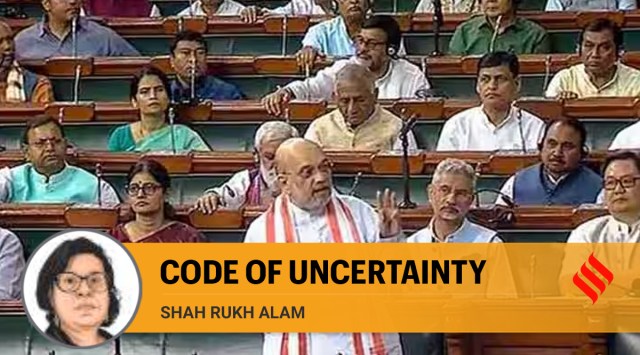
The government has tabled three new bills in Parliament, which in turn repeal three trusty old codes: The Indian Penal Code of 1860, the Code of Criminal Procedure, 1898 (reenacted in 1973), and the Indian Evidence Act, 1872. We understand the current criminal justice system in terms of these three statutes and the significant body of related case law that provides precedent and jurisprudence. The new bills were abruptly introduced in the supplementary business list, without notice or any significant consultation. It is unclear how the new laws will affect current criminal justice jurisprudence as it has evolved over long years of deliberation and practice. Will the change in procedure and laws of evidence affect ongoing trials? Do the new laws imagine a liberating rupture from the past, which ironically is a rather colonial technique?
The Sanskritised new names may seek to imply an exercise in decolonisation, but they only manage to convey a sense of linguistic hegemony. Besides, they grant more discretionary powers to authorities in the style of colonial states. This sudden shift exacerbates the sense of uncertainty and links to a larger debate around rule of law.
Quite often these days, in claims of inaction or discriminatory behaviour by public authorities that are brought before the Supreme Court, the state’s main response is perfunctory: “Why do they keep coming to the Supreme Court with such complaints?” There are other remedies available: They could write to the authorities asking them to act against incitement of violence; they could file applications before the magistrate asking for registration of FIRs if the police are being negligent despite representations; they could go to the high courts.
Thus, the respondent state does not immediately engage with prima facie incidents of discrimination. Instead, it reiterates the need for judicial discipline — go to the right forum. This is akin to instances of complainants running from one police station to another, trying to find the one that had proper jurisdiction, before the notion of “zero FIRs” was recognised.
It is true, however, that writ petitions asking for immediate interventions to protect life or liberty are often concentrated in the apex court. This follows as much from the egregious nature of the breach in question and the urgency of the reliefs required as from the fact that there is a centralisation of civil-liberties-centred legal resources in Delhi. It would be wonderful if such resources were more evenly distributed.
Yet, this isn’t the best defence for breaching judicial discipline, a notion that links to the importance of certainty in the rule of law. The legal order is based on the understanding that law must be accessible and, so far as possible, clear and predictable. Certainty is not the only or ultimate aim of the law — there is something to be said for judicial assessments of contexts and of substantive equalities. However, principles of legitimate expectation and an assurance of legal certainty are central to rule of law. However, each time a case for immediate intervention to protect life or liberty is brought before the Supreme Court, there is uncertainty. The petitioner or her lawyers, do not know whether the petition will be entertained or whether they will be asked to follow other remedies available to them.
The bills formalise uncertainty in rule of law. Their running theme is ambiguity of meaning and thus increased discretion in the hands of law enforcement authorities.
But a violent discursive rupture to what end, we ask ourselves. In terms of its contents — in its reclassification of offences; in its vague and overbroad definitions of “criminal activity” (“subversive activities”, which might include any form of critique, or ‘terrorist acts’, which now include damage to property, and also provocation or intimidation to the government); in its grant of enhanced policing powers (a person may be arrested for refusing to furnish their name and details to a policeman; the period of detention without charge has been substantially increased); and in its grant of powers to policemen to use discretionary violence (“if a person is evading arrest, may use all means necessary”; “keeping in view nature and gravity of offence, may use handcuffs”; “women may be arrested after sunset in exceptional circumstances”) — there is only manifest arbitrariness. Significantly, it also recognises mob lynching as a separate offence, where the motivation for violence is the victim’s identity alone. However, the sentence is discretionary and may be reduced to seven years, which is significantly less than a “normal murder” conviction. Pointedly, the sentence for concealing one’s identity before marriage is 10 years. The new Bills carry all the marks of an opaque colonial state.
It is interesting to think about the many ways in which certainty in rule of law is framed in public discourse: In terms of equality of status or challenges to vague and overbroad provisions, but also in terms of judicial discipline, and centralisation of power with the “hard state”.
The writer is a lawyer practising in the Supreme Court